An independent researcher. We encourage readers to verify information.
Kennedy Debunked | Vol. 1
Kennedy Debunked
Explore Debunks
Explore Debunks
Reality: The CDC data shows that measles has never been entirely eradicated in the United States. Although there was a rise in measles cases following the easing of lockdowns and travel restrictions in 2020, this was to be expected. The majority of measles cases in the U.S. are imported, meaning they are brought in by travelers who contract the disease abroad and then bring it into the country. With the lifting of travel bans, the number of imported cases naturally increased. However, it is important to note that the overall number of measles cases has dropped significantly since 2019.
Measles Never Went Away
Contrary to popular belief, measles has never been completely eliminated from the United States. Measles cases have been recorded every year. Nearly all measles cases were imported cases, meaning a traveler was exposed abroad and brought it into the U.S.
Below is a breakdown of measles cases by year from the CDC, highlighting the fluctuation in case numbers and the presence of measles in the U.S. even before the recent debates over vaccination:
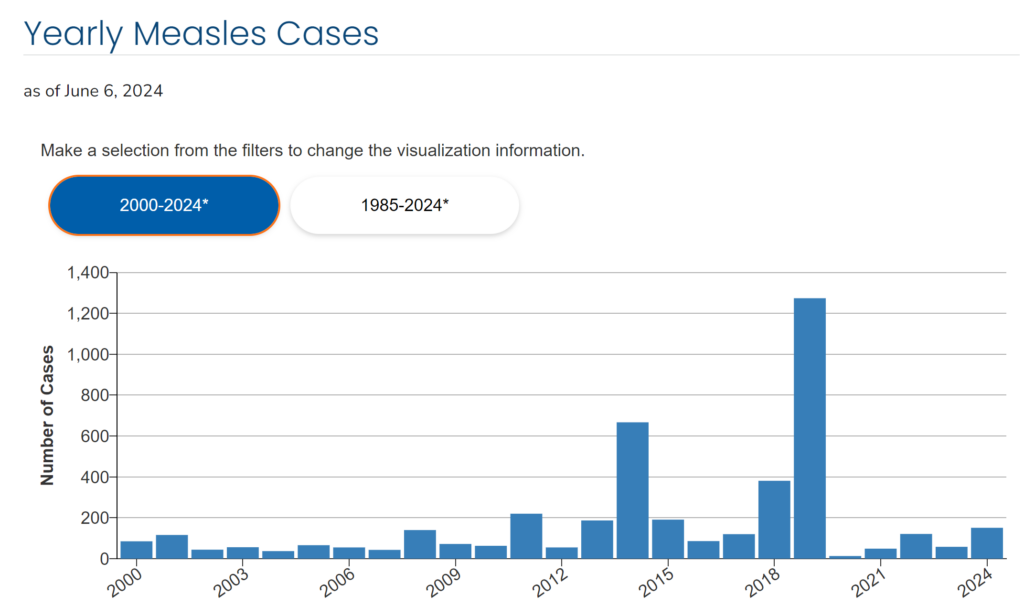
2019 Measles Outbreak
The 2019 measles outbreak in the United States saw a significant rise in cases, from 381 in 2018 to 1,274 in 2019. This increase is often cited as evidence of a resurgence linked to anti-vaccine rhetoric. However, the details of the outbreak reveal a different story. According to a New England Journal of Medicine analysis, the outbreak began when one unvaccinated child returned home from abroad with measles, triggering a localized outbreak in New York City.
This was not a widespread outbreak across the entire U.S. but rather a concentrated incident in the Williamsburg area. 72.9% of cases between September 30, 2018, and July 15, 2019 were from this area.
Understanding Vaccination and Reporting Bias
The New England Journal of Medicine study reports that “85.8% of the patients with a known vaccination history were unvaccinated.” This statistic is often used to argue that unvaccinated individuals are primarily responsible for measles outbreaks. However, it’s important to note potential biases in reporting vaccinated cases. The study highlights that:
“Because of the potential for a false positive IgM assay, patients who lacked clinical information and had only a positive IgM assay were included only if they were confirmed to be unvaccinated, since the likelihood of a true infection would increase in the absence of vaccination.”
This suggests that vaccinated cases may have been underreported due to the exclusion of cases that could not be confirmed through clinical information. The bias towards reporting unvaccinated cases can skew the perception of the role of vaccination in measles outbreaks.
Mumps Outbreak Among Vaccinated
Interestingly, Brooklyn also experienced a mumps outbreak in 2009. The analysis of the 2009 mumps outbreak provides critical insights:
“Transmission was focused within… schools for boys, where students spend many hours daily in intense, face-to-face interaction… The epidemiologic features of this outbreak suggest that intense exposures, particularly among boys in schools, facilitated transmission and overcame vaccine-induced protection in these patients.”
The mumps outbreak, which occurred among a highly vaccinated population, was driven by the high-density, close-contact environment of the schools, which facilitated the spread of the virus despite vaccination. This context is crucial for understanding the dynamics of infectious diseases. Vaccination is never 100% effective and other factors can contribute to an outbreak.
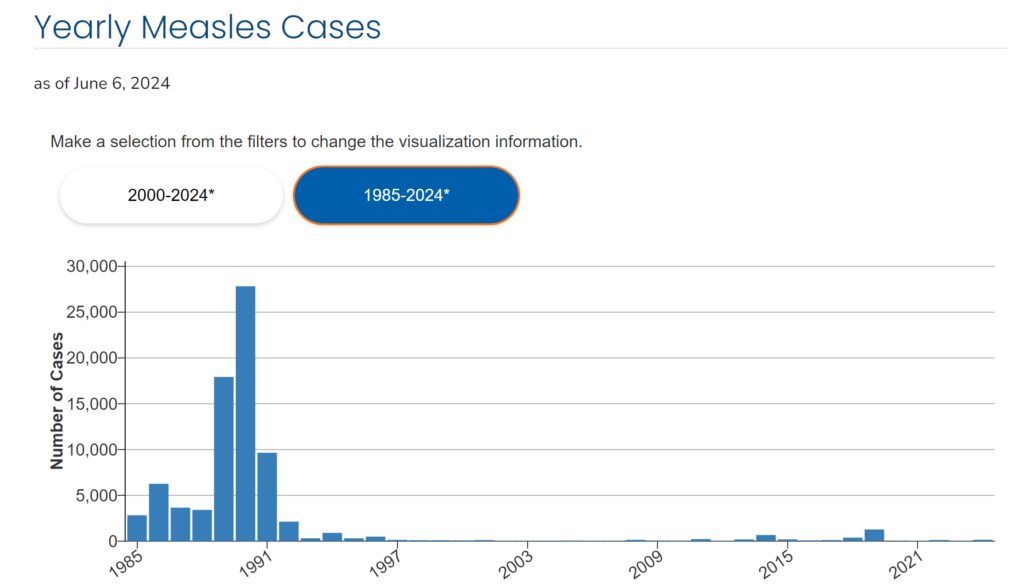
Data Insights from CDC Reports and Studies
According to a CDC analysis, “During January 1, 2020–March 28, 2024, CDC was notified of 338 confirmed measles cases; 97 (29%) of these cases occurred during the first quarter of 2024, representing a more than seventeenfold increase over the mean number of cases reported during the first quarter of 2020–2023. However, this is expected as travel restrictions and lockdowns were in place in 2020. As we learned, most cases are imported. Travel restrictions being lifted are the primary reason for the increase in cases since 2020. It is notable to point out that the U.S. still has less cases so far in 2024 (151 measles cases) than in 2019, 2018. 2015, 2014, 2013, 2011, and more.
As you can see below, the highest vaccination year was also the year of the 2019 measles outbreak. According to the CDC, the vaccination rate for kindergarteners was 95.2%. Once again, this suggests that outbreaks are more nuanced than vaccination rates.
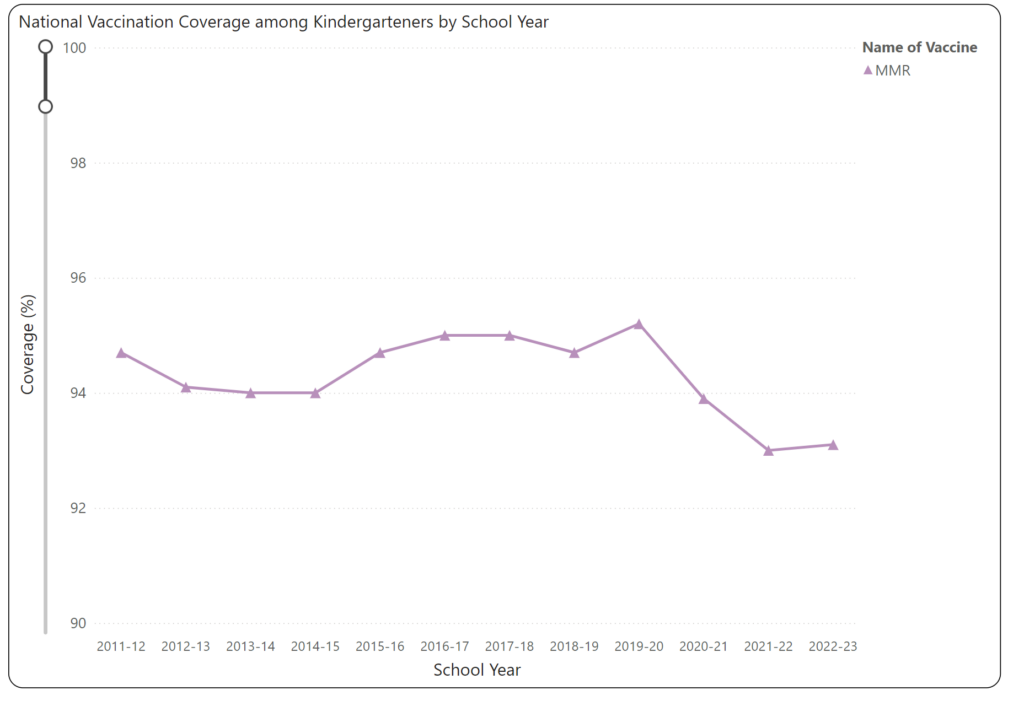
Who’s to Blame?
The claim that Robert F. Kennedy Jr. is responsible for the resurgence of measles is baseless and misleading. Data shows that measles has never been fully eradicated in the U.S., and recent outbreaks are primarily due to imported cases, not domestic anti-vaccine sentiment. The 2019 outbreak was localized in Williamsburg, Brooklyn, and caused by international travel, not a widespread anti-vaccine movement. High vaccination rates in 2019 and a similar mumps outbreak in 2009 in the same community illustrate that other factors, like close-contact environments, contribute to disease spread.
Blaming Kennedy is misleading and ignores the true causes of these outbreaks. It also ignores the fact that vaccination is never 100% effective and that while you may have a reduced risk of measles, mumps, and rubella, you can also have other side effects. “I think some of the live virus vaccines are probably averting more problems than they’re causing,” Kennedy told Lex Fridman. The CDC says, “There are risks in taking any medicine, vitamin or other supplement.” A person should have the bodily autonomy to weigh the risks and benefits for themselves to make an informed decision. Read more about his vaccine stance here. Kennedy is also running to end the chronic disease epidemic. We are paying more for healthcare than anywhere in the world but have the worst health outcomes. Read more about his policies here.
Reality: His comments on prosecuting climate deniers have been taken out of context and are false. The comments were targeted specifically to the Koch brothers who knowingly spread misinformation about climate change for profit.
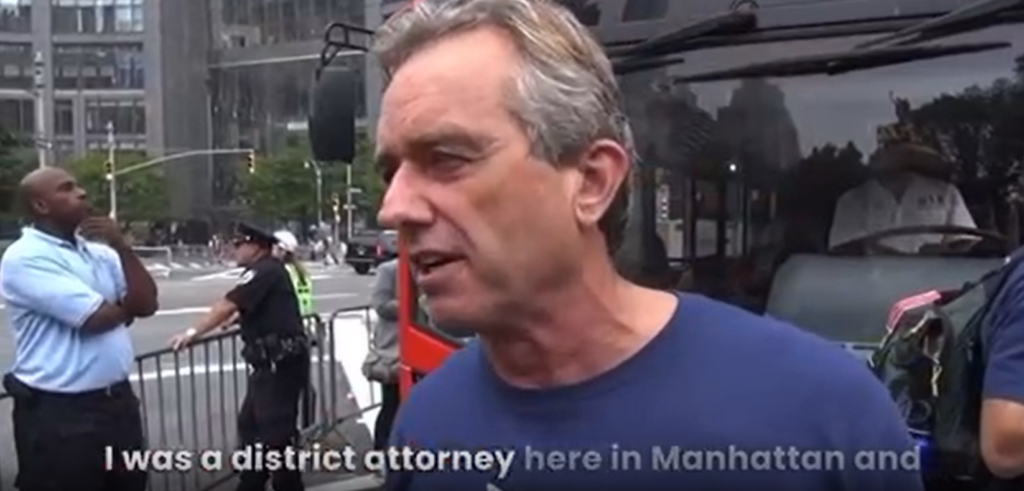
The Source of the Climate Denier Claim
The video that is being taken out of context is from September 21, 2014. On this day, hundreds of thousands of people gathered to demand action on climate change, marking the largest environmental protest in history. RFK Jr. was also protesting when reporters asked him questions.
During RFK Jr.’s environmental work, he became very familiar with the Koch brothers and their schemes. Rolling Stone posted an article in 2014 about the brothers:
“According to the University of Massachusetts Amherst’s Political Economy Research Institute, only three companies rank among the top 30 polluters of America’s air, water and climate: ExxonMobil, American Electric Power and Koch Industries. Thanks in part to its 2005 purchase of paper-mill giant Georgia-Pacific, Koch Industries dumps more pollutants into the nation’s waterways than General Electric and International Paper combined. The company ranks 13th in the nation for toxic air pollution. Koch’s climate pollution, meanwhile, outpaces oil giants including Valero, Chevron and Shell. Across its businesses, Koch generates 24 million metric tons of greenhouse gases a year.
For Koch, this license to pollute amounts to a perverse, hidden subsidy. The cost is borne by communities in cities like Port Arthur, Texas, where a Koch-owned facility produces as much as 2 billion pounds of petrochemicals every year.”
Quote Taken out of Context
Reporter: “What about politicians? People who deny, who express skepticism?”
RFK Jr.: “I think they are selling out the public trust and, you know, I think those guys who are doing the Koch brothers bidding and who against all the evidence of the rational mind, are saying that global warming doesn’t exist. That they are contemptible human beings and that, you know, I wish there was a law you can punish them under.”
View the entire clip below:
Key Takeaways:
Nick Gillespie and Zach Weissmueller on ReasonTV confronted Kennedy on this. Here is a summary of what he had to say:
Kennedy’s remarks were focused on the harmful actions of specific corporate entities, not on individuals who personally doubt climate change. He expressed frustration with corporations like the Koch brothers who were knowingly contributing to pollution and spreading misinformation for profit.
He advocates for legal accountability for corporations that engage in deceptive practices harmful to the public and the environment. He draws parallels to the tobacco industry, which was prosecuted for misleading the public about the dangers of smoking.
Kennedy acknowledges that his views have evolved and that he would approach the issue differently today, recognizing the complexity of the discourse around climate change and free speech.
Conclusion
The claim that RFK Jr. wants to jail climate deniers misrepresents his actual position. His statement targeted the corporate disinformation campaigns that the Koch brothers engaged in. It is also important to note that while Kennedy is an environmental activist, his policies do not align with the Green New Deal. Read more about that here.
Kennedy has been in the public eye his entire life, making him a target for intense scrutiny. The DNC has hired individuals to sift through every statement and action from his past, aiming to spin them into a smear campaign. For readers, a piece of advice: always get the context. Imagine someone dissecting your life, picking apart old posts and taking them out of context. It’s crucial to consider the full picture before forming an opinion.
For additional context at the time, view this Tedx Talk from RFK Jr. It goes over his position at the time more in depth.
Reality: RFK Jr. is not anti-vaxx; he is pro-science and advocates for vaccine safety, transparency, and informed consent. He has said, “My vaccination policy will not take away vaccines from anybody who wants access to them.”
1. RFK Jr. is Vaccinated
Robert F. Kennedy Jr. has repeatedly clarified that both he and his children are vaccinated. This fact directly contradicts the label of “anti-vaxxer.” During his testimony before Congress on July 20th, 2023, he addressed these accusations head-on:
“At one point you say I’m anti-vaxx and that’s a bad thing. The other moment you point out that all my children are vaxxed. I’m fully compliant with the vaccine schedule myself except for COVID. I took flu vaccines for 20 years straight. I have never been anti-vaxx.”
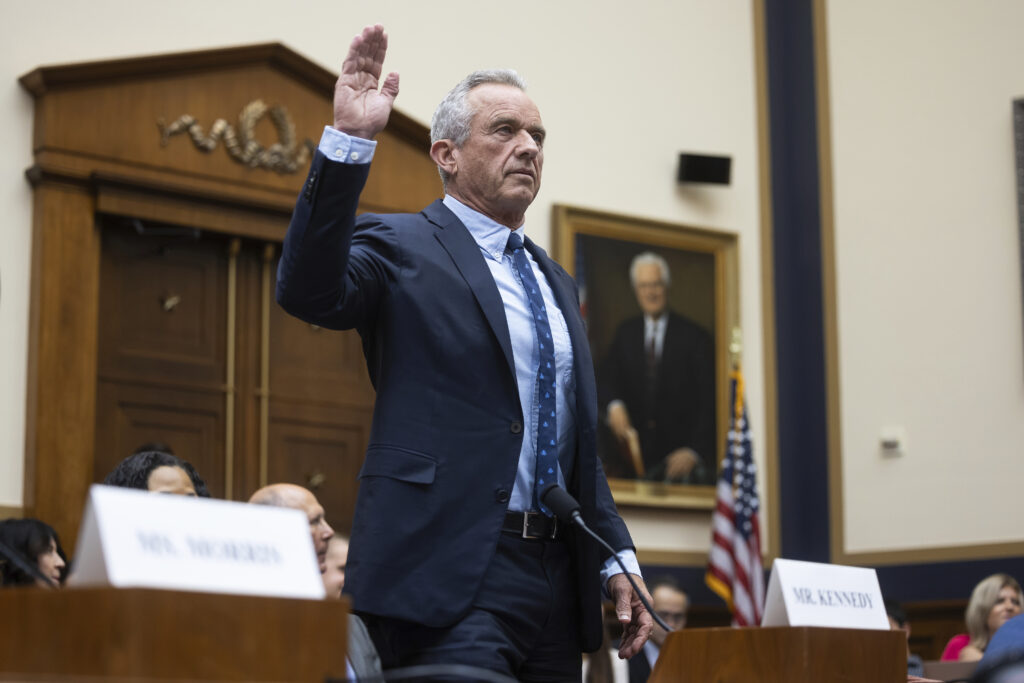
2. RFK Jr. is Pro-Science
Kennedy emphasizes the importance of rigorous testing and transparency in vaccine development. His primary concern is that vaccines should undergo the same rigorous safety and efficacy testing as other medical products. In an interview with Brian Tyler Cohen on May 26th, 2024, he stated:
“What I want is good testing, good safety testing for vaccines, good efficacy testing so that everybody knows and can make informed consent about whether they want this product or not, whether it’s good for their age group, whether it’s good for their cohort, whether it’s good for them. And let’s do the same kind of safety testing that we require for other drugs and we don’t do that for vaccines.”
Under U.S. Code § 300aa–22, the law acknowledges that vaccines have unavoidable side effects, which is why vaccine manufacturers are generally immune from liability in most cases:
“(b) Unavoidable adverse side effects; warnings (1) No vaccine manufacturer shall be liable in a civil action for damages arising from a vaccine-related injury or death associated with the administration of a vaccine after October 1, 1988, if the injury or death resulted from side effects that were unavoidable even though the vaccine was properly prepared and was accompanied by proper directions and warnings.”
RFK Jr simply believes that vaccine manufacturers should not have blanket immunity. These companies are not immune when patients have adverse effects from their pharmaceutical drugs; vaccines should be no different.
3. RFK Jr. is Pro-Medical Freedom
RFK Jr. strongly believes that vaccination should be a personal choice and opposes mandatory vaccination policies. He argues that no medical intervention should be mandated without informed consent. In the same interview with Cohen, he emphasized:
“My vaccination policy will not take away vaccines from anybody who wants access to them. My only issue is they should not be mandated. I don’t think any medical intervention should be mandated.”
Kennedy’s stance is clear: while he supports the availability of vaccines for those who want them, he opposes mandates and insists on the necessity of informed consent based on transparent and thorough safety data. The more data that is available, the more people will feel confident to make the right choice.
Take smoking as an example. Doctors at one time said smoking was fine for people, even pregnant women. While cigarettes are not banned, their use has gone down as additional science was performed. This gives consumers informed consent.
4. RFK Jr. has Never been Called Anti-Fish
Kennedy’s work as an environmental lawyer includes significant efforts to remove mercury from waterways. Mercury is a known toxin, and the CDC warns about its dangers:
“All forms of mercury can affect the nervous system and the kidneys.”
This is a stance that CDC contradicts itself on. On one hand, it says all forms of mercury are dangerous, on the other hand, they say some forms of mercury are ok in vaccines.
“Two types of mercury to which people may be exposed — methylmercury and ethylmercury — are very different.”
Through his environmental advocacy, Kennedy discovered that mercury was also present in vaccines in the form of thimerosal, a preservative. Worried moms started to appear at all his events to tell him about their experiences with vaccines and how they believe their children were harmed by them. These moms knew RFK Jr. was serious about getting mercury out of fish, so they wanted him to be serious about it in all aspects.
He campaigned for its removal from vaccines. Today, mercury is out of some vaccines, but not all. According to the CDC, “Influenza (flu) vaccines are currently available in both thimerosal-containing (for multi-dose vaccine vials) and thimerosal-free versions.”
Many vaccines also contain aluminum. “More research attention has been given to EtHg and findings have showed a solid link with neurotoxic effects in humans; however, the potential synergic effect of both toxic agents has not been properly studied,” were the findings in this analysis.
“I fought to remove mercury from fish but nobody called me anti-fish.”
This quote encapsulates his position: advocating for the removal of a harmful substance does not equate to opposing the entire category. Similarly, advocating for vaccine safety does not make him anti-vaccine.
Conclusion
Labeling Robert F. Kennedy Jr. as “anti-vaxx” oversimplifies his position and misrepresents his advocacy efforts. RFK Jr. is pro-science and focuses on vaccine safety, transparency, and regulatory reform. He supports the use of vaccines that are thoroughly tested and proven safe and believes that enhancing public trust in vaccines requires addressing valid safety concerns and ensuring that regulatory processes are transparent and free from conflicts of interest.
This mini documentary goes through the smear campaign on RFK Jr, his environmental work, how he learned about mercury in vaccines, and what he wants to do going forward.
Reality: Although RFK Jr. is a passionate environmental advocate, he does not endorse the Green New Deal. Instead, he focuses on market-based solutions and regulatory reforms, something most Americans agree on.
What is The Green New Deal
The Green New Deal (GND), introduced by Representative Alexandria Ocasio-Cortez (AOC) in 2018, aims to address climate change and economic inequality. It seeks to achieve net-zero greenhouse gas emissions by 2030, transition to 100% clean energy, and upgrade infrastructure.
The GND emphasizes economic and social justice, proposing a jobs guarantee, public investment in green technologies, and support for workers transitioning from fossil fuel industries.
Contrary to what many believe, this bill seeks to address many more issues than just the environment. It also aims to address inequality through universal healthcare, affordable housing, and education.
A significant aspect of the GND is its reliance on government subsidies and interventions, which will surely add the the national debt. In contrast, RFK Jr. is against subsidizing most corporations.

RFK Jr.’s Approach
Robert F. Kennedy Jr. has a long history of environmental activism, focusing on regulatory reform, market-based solutions, and grassroots activism. He opposes government subsidies for clean energy, believing that in a true capitalist market, companies will naturally adopt clean energy because it is cheaper and meets consumer demand.
His primary focus is on eliminating toxins from food and water, a goal that resonates with people across the political spectrum.
Key Differences Between RFK Jr.’s Views and the Green New Deal
While the GND emphasizes broad economic restructuring, RFK Jr. focuses on combating pollution and protecting natural resources through market forces.
While capitalism gets a bad name these days, it is only due to the government intervening on true free-market capitalism by awarding grants and subsidies for mega corporations. Kennedy believes that in true free market, corporations will naturally go to clean energy because it is more sustainable, cost effective, and it’s what consumers demand.
RFK Jr. has never set a specific date or expressed a desire to completely eliminate carbon emissions. He aims to reduce pollution, unlike the GND, which seeks to end carbon emissions completely by 2030.
RFK Jr.’s Environmental Policies
RFK Jr.’s campaign highlights his commitment to addressing environmental issues through free-market solutions and sensible regulations. His policies include:
- Supporting an international plastics treaty.
- Implementing safety regulations to prevent chemical accidents.
- Promoting a national bottle bill.
- Coordinating a national Extended Producer Responsibility (EPR) system.
- Modernizing recycling facilities.
- Ending subsidies for plastic producers.
- Holding fracking and petrochemical companies accountable for pollution.
RFK Jr. believes that climate change is a serious problem but rejects using it for profit-making schemes by big corporations and government authorities.
He has stated, “I’m not going to ask everyone to accept that or to get on board with the climate change orthodoxy,” and “in a true free market that doesn’t rely on subsidies and crony capitalism.”
Conclusion
Robert F. Kennedy Jr. is a committed environmental advocate who does not support the Green New Deal. His strategies focus on regulatory enforcement, market-based solutions, and grassroots activism.
RFK Jr. believes in free market capitalism, emphasizing that companies should move towards clean energy due to market demand rather than government subsidies. He prioritizes reducing pollution and ensuring a clean environment for future generations, a goal shared by many, despite differing opinions on how to achieve it.
RFK Jr. wants to give $5 billion that was promised to thousands of farmers through litigation who were discriminated against by the USDA.
The New York Post published an article titled “RFK Jr. says he would give black farmers $5B in reparations — despite ruling that it’s unconstitutional,” which is misleading. Their own citation leads you to an article of theirs that says, “Judge William Griesbach issued a temporary restraining order Thursday halting the program while the case is decided.” This was not a final ruling.
This program was never intended to give money to farmers solely based on their skin color. It was to give money to farmers who were actually discriminated against for years that resulted in a loss of their farm land.
Context
In the podcast, John Boyd detailed the systemic discrimination black farmers faced from the USDA. Historically, black farmers were denied loans and support that white farmers received, leading to widespread foreclosure and loss of black-owned farmland.
Boyd emphasized that this discrimination was not just historical but continued well into recent decades.
The National Black Farmers Association (NBFA) outlines this history of discrimination in detail. In 1920, 14% of farms were black-owned, but today, only 1.7% are. Additionally, black-owned farms disproportionately receive less government funding, obtaining only 0.6% of the total funds given to farms.
Boyd mentioned that in 1997, two lawsuits were filed against the USDA for this discriminatory treatment. These lawsuits resulted in settlements that promised injunctive relief and debt relief for black farmers. However, despite these promises, the black farmers did not receive the promised land and debt relief.
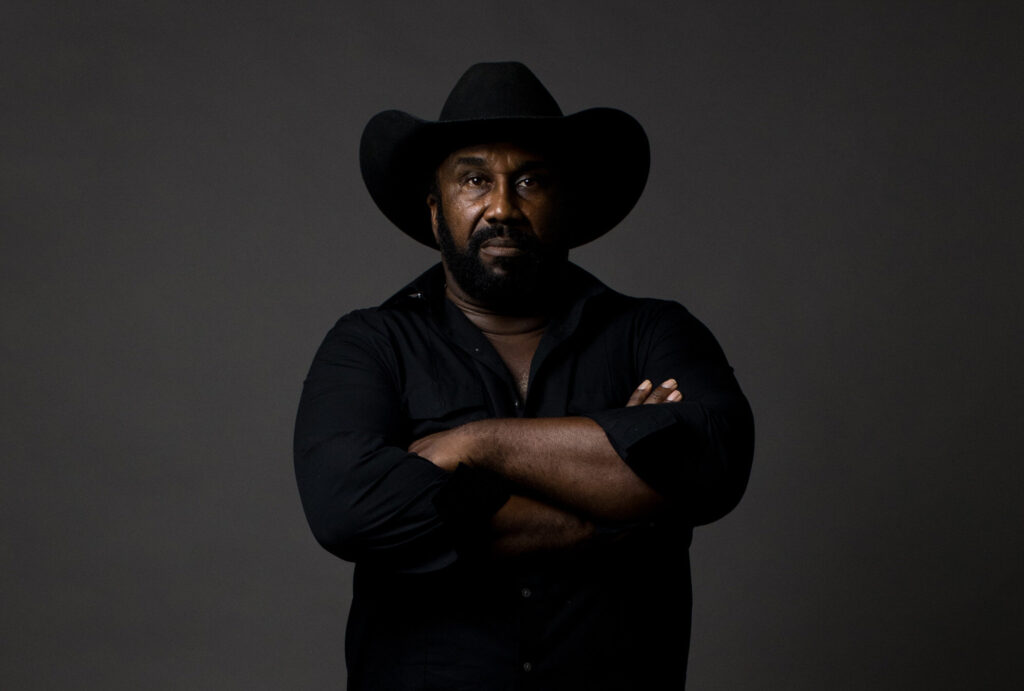
John Boyd, an African American farmer and founder of the National Black Farmers Association, sums up the situation on RFk Jr.’s podcast:
“You know, here we have a debt relief measure that passed. It passed under the American Rescue Plan for $5 billion.
And then after it passed, USDA kind of dragged its feet on implementing the $5 billion, you know, getting it out to the 16,000 eligible farmers.
So USDA already know who the farmers are, already know what the amounts are supposed to be provided debt relief and they dragged their feet to do it.
They drag their feet and then we wind up white farm that started suing us in federal court around the country and Texas and then Florida and all around and how to organize our monies to defend ourselves in those courts.
And finally, after we won one or two motions in federal court, the administration repealed it by another act of Congress and the IRA bill spending bill.
So they took it all away while I was in court fighting. And here we sit in front of you.
We didn’t get the debt relief and it’s going on for decades, you know, and what I want to explain to people, I don’t want people to look at this and say these farmers want them, they give them something.
That’s not the case.
We were promised U.S. debt relief back from the 90s. We didn’t get it in two settlements. I turned to Congress in 2016.
It stripped the language, wound up getting it in 2021. And then Congress, this administration, this president repealed it by an act of Congress and they haven’t spoken the words debt relief to black and other farmers of color since they repealed it.”
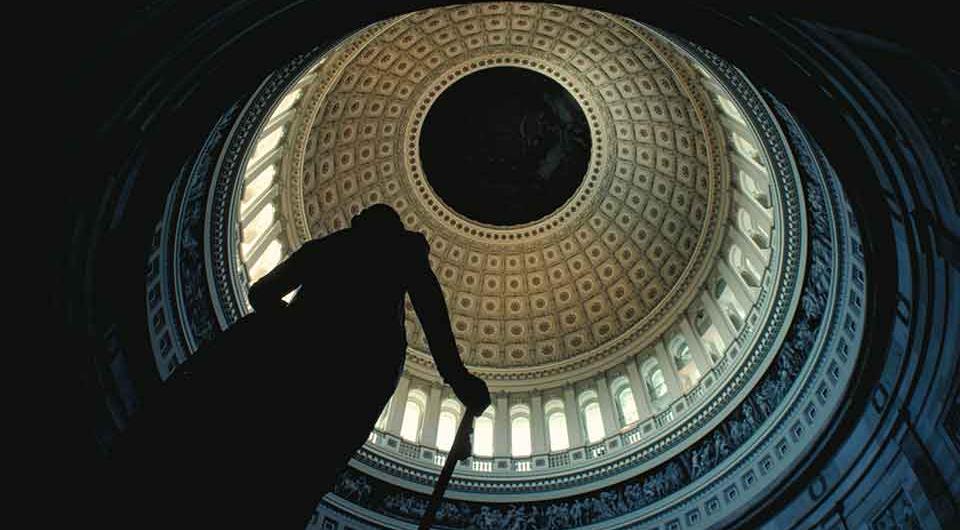
Legislative Efforts and Broken Promises
Boyd also discussed the Claims Remedy Act, sponsored by Senator Ted Kennedy, which provided $1.25 billion for black farmers. Despite this legislation, black farmers have continued to struggle due to unfulfilled promises from the USDA and the federal government.
In 2021, under the American Rescue Plan, $5 billion was allocated for debt relief for black and other farmers of color. Boyd put out a statement when the act was passed, saying, “The American Rescue Plan Act of 2021 will help address the ongoing effects of discrimination by reducing the risk of foreclosure and increasing access to credit.”
However, the USDA delayed the implementation of this debt relief, and subsequent lawsuits by white farmers led to further complications. Eventually, the relief was repealed by Congress under President Biden’s administration, leaving black farmers without the promised support.
Misunderstood Term: Reparations
The term “reparations” is often overused and watered down. This is not the reparations that is used in the modern way. This is not giving money to people just because of skin color.
In this context, the $5 billion is not about providing new entitlements but about fulfilling court-ordered payments for past discrimination cases that were never fully resolved.
Many payouts were not fulfilled because the statute of limitations lapsed by the time these farmers saw their day in court. Boyd is seeking reparations specifically for the actual discrimination he and other minority farmers experienced with the USDA.
John Boyd shared a firsthand account of the discrimination he experienced:
“Farmers need operating loans every year to plant and harvest on time. So I’m no different.
I’m trying to get a farm operating loan and, and one particular year I was in the office and I was trying to get $5,000.
I was down. I went from, I started at 20 and by the time I left the session, I said, ‘Look, can I just get $5,000 farm operating?’ And he says no.
And here comes Farmer Earl, a white farmer.
He walks into the office, he greets him as Earl and his whole voice and demeanor changed when Earl came in. ‘Hey Earl.’ And like they were friends, he passes Farmer Earl a check for $157,000.”
Boyd further described another instance of discrimination:
“I had a poultry contract where USDA were taking the payments out of my check and was supposed to be giving me credit on my loans.
No one knows what happened to the money.
I got no credit on my loans and I wound up in farm foreclosure. And when they investigated him and asked him what happened to Mr. Boyd’s monies that Purdue Farms were sending every week, he said, ‘Well, I accidentally applied them to another poultry farmer’s assignment account.'”

RFK Jr.’s Position
RFK Jr. expressed his commitment to addressing these injustices if elected president. He emphasized that the $5 billion is not a new entitlement:
“I’m going to get rid of those people in USDA and get that money.
That 5 billion is not money that is an entitlement, it’s money that was a loan that black farmers were entitled to way back then and was stolen from them through discrimination.
You know, you, you can testify that it was personally stolen from you and that’s what the court found.
If you were white you got it, but if you were black, you wouldn’t get it.”
Conclusion
The New York Post’s headline mischaracterizes RFK Jr.’s stance. He did not propose unconstitutional reparations; rather, he highlighted the need to fulfill past promises of debt relief to black farmers who suffered from actual discrimination. This distinction is crucial for understanding his position and the broader context of the historical injustices faced by black farmers in the United States.
For more information, you can listen to the full podcast episode where RFK Jr. and John Boyd discuss these issues in detail.
The Origin of the Brain Worm Story
On May 8th, 2024, The New York Times published an article about Robert F. Kennedy Jr. that caused quite a stir. The article referenced a deposition RFK Jr. gave during his divorce proceedings in 2012, where he discussed experiencing brain fog that some doctors initially believed was cancer. The New York Times stated, “The doctor believed that the abnormality seen on his scans ‘was caused by a worm that got into my brain and ate a portion of it and then died,’ Mr. Kennedy said in the deposition.”
The Story Goes Viral

Unsurprisingly, this sensational story quickly went viral, sparking both concern and humor. Amid questions about a potential presidential debate, RFK Jr. responded on social media platform X, saying, “I offer to eat 5 more brain worms and still beat President Trump and President Biden in a debate.” He followed up with a comment, “I feel confident of the result even with a six-worm handicap.”

1 in 4 People Have Parasites
According to the World Health Organization (WHO), approximately 25% of the world’s population has an infection related to an intestinal parasite. In tropical and subtropical areas with limited access to clean water and sanitation, that number is as high as 50%.
The Reality: Neurocysticercosis
On May 14th, RFK Jr. appeared on Matt and Shane’s Secret Podcast, where he provided clarity on the situation. He revealed that he had been diagnosed with Neurocysticercosis, a parasitic infection caused by the pork tapeworm, Taenia solium. This condition occurs when the larvae of the tapeworm enter the brain, leading to various neurological symptoms, including brain fog.
What is Neurocysticercosis?
Neurocysticercosis is a common parasitic infection in regions with poor sanitation and where pork is a dietary staple. It is particularly prevalent in India and in the hog industry. The infection occurs when individuals ingest eggs of the tapeworm, which then travel to the brain and form cysts. Symptoms can range from headaches and seizures to confusion and brain fog.
RFK Jr. explained on the podcast that he had traveled to India numerous times for his work and had been involved in lawsuits against corporate hog farms for many years. He believes that his brain fog was likely due to mercury poisoning rather than the brain worm itself.
Assurance of Recovery
Today, RFK Jr. assures the public that he has fully recovered from the brain fog he experienced at the time. He emphasizes that his neurological health is intact and that he remains fit to serve in any capacity, including as President.

Conclusion
The story of Robert F. Kennedy Jr. having a brain worm is rooted in a real medical condition, but it has been sensationalized and misunderstood. RFK Jr. suffered from Neurocysticercosis, a parasitic infection common in certain regions and industries. He has since recovered and remains confident in his abilities. This incident highlights the importance of understanding the context and facts behind sensational headlines.
6 out of 105 Kennedys Publicly Endorsed Joe Biden
Robert F. Kennedy Jr., a prominent environmental attorney and activist, has faced criticism from various members of his family, leading to the misconception that his entire family does not support him. Despite this perception, it is crucial to understand that only 6 out of approximately 105 close Kennedy family members have publicly endorsed Joe Biden. They have not endorsed Kamala Harris. This has led to misinformation suggesting the entire family is against RFK Jr.
When family members do speak about RFK Jr.’s candidacy, they often refer specifically to his independent ticket. For example, Kerry Kennedy stated, “We cannot have Trump in for four more years.” Similarly, in an interview with CNN, when asked whether she sees her brother’s campaign as a danger because it siphons votes away from Joe Biden or because of his policies, Rory Kennedy responded, “It’s really about siphoning votes from Biden.” This underscores that their concerns are not primarily about RFK Jr.’s policies but rather the fear that he might act as a spoiler candidate.
Timeline of Events
July 21, 2023: Jack Schlossberg’s Instagram Reel
On July 21, 2023, Jack Schlossberg made an Instagram reel from a car, where he criticized RFK Jr.’s candidacy by saying, “I have no idea why anyone thinks he should be president.” He also gave controversial talking points about President Biden’s success, including statements like “he ended our longest war, he ended the COVID pandemic, and he ended Donald Trump.” We encourage readers to visit his social media pages to form their own opinion on his credibility. Jack Schlossberg’s Instagram and Jack Schlossberg’s X profile.
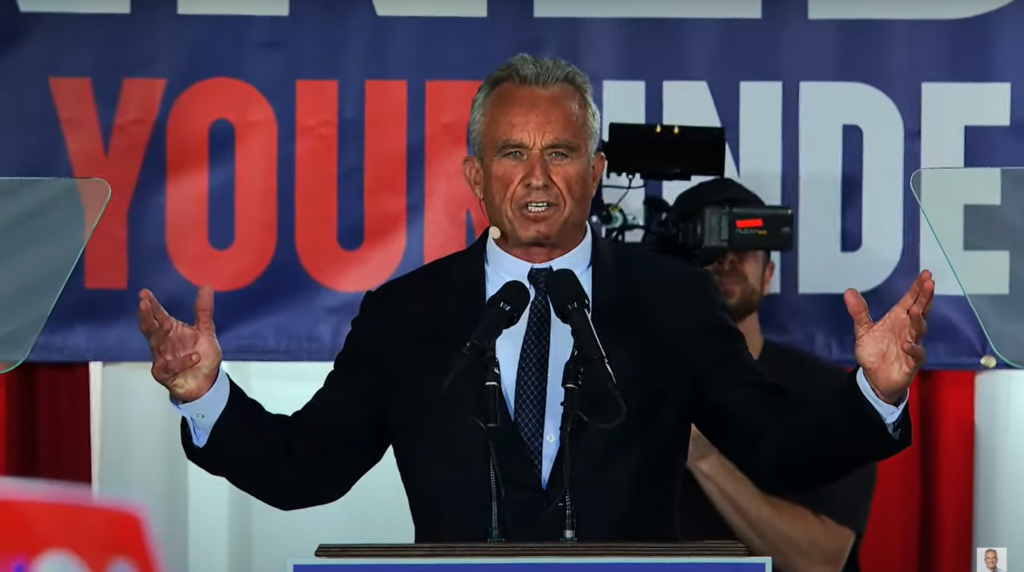
October 9, 2023: RFK Jr. Announces Independent Run
On October 9, 2023, Robert F. Kennedy Jr. announced that he would be running for president as an independent candidate. This decision marked a significant shift from his previous alignment with the Democratic Party and sparked immediate reactions from his family. Remember, the Kennedy family has been a part of the Democratic Party for generations, long before even JFK. RFK Jr.’s separation from the party was a shock, not only to his family, but to all.
Family Reaction:
Four family members took to social media to express their concerns, stating, “The decision of our brother Bobby to run as a third party candidate against Joe Biden is dangerous to our country.” It is noteworthy that they made no public comments about his presidential run until he decided to run as an independent. Anthony Shriver, RFK Jr.’s cousin replied to this post saying, “I was so proud to be standing next to my cousin Bobby today. His energy and values are everything our family believes in.”
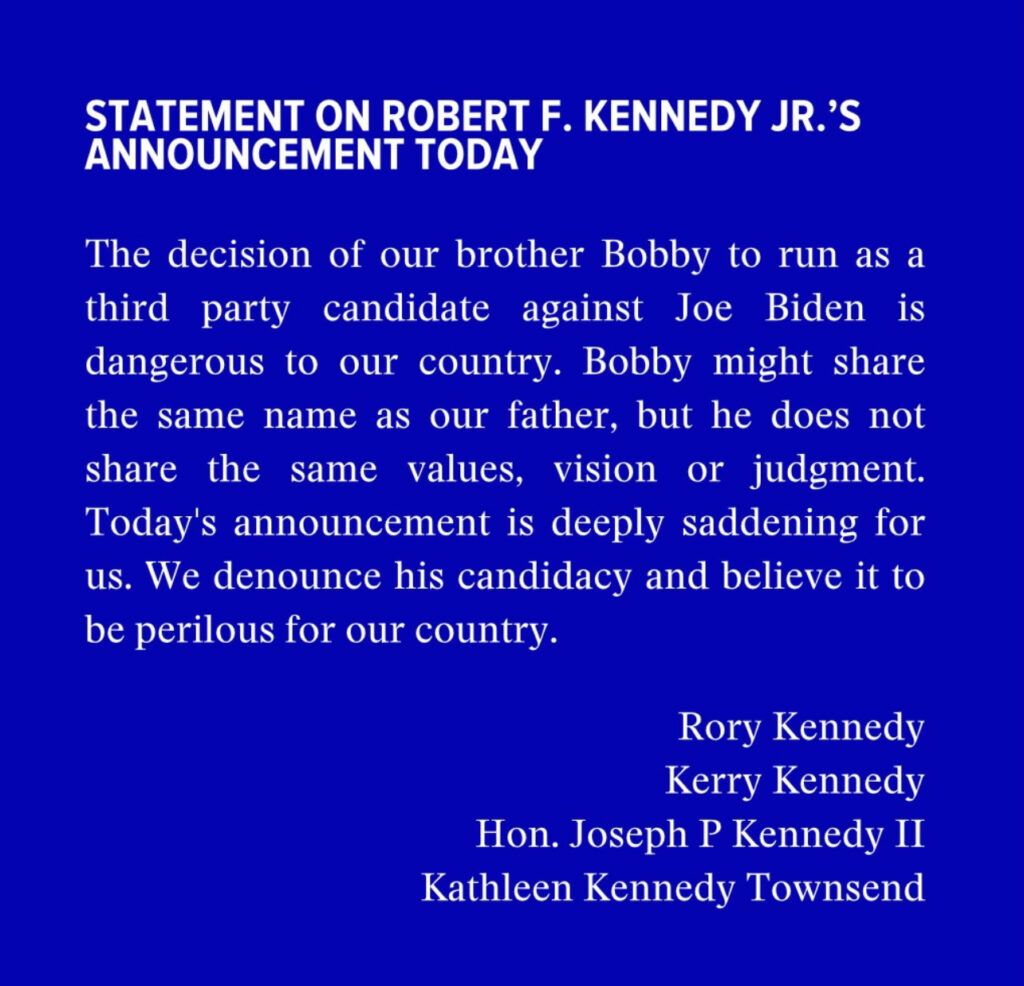
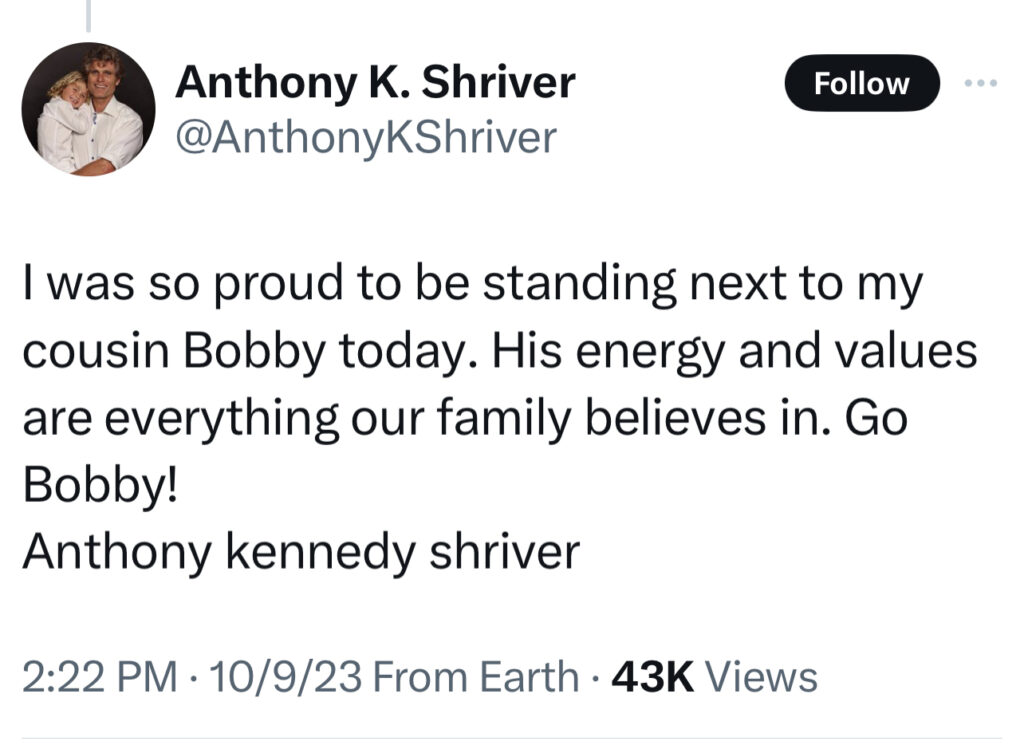
March 17, 2024: St. Patrick’s Day Event
On St. Patrick’s Day, Joe Biden and several Kennedy family members took to social media to post an image of a large portion of the Kennedy family with President Biden. Many people took this photo as an endorsement when no such endorsement was given at the time. The photo did not even show half of the Kennedy family.
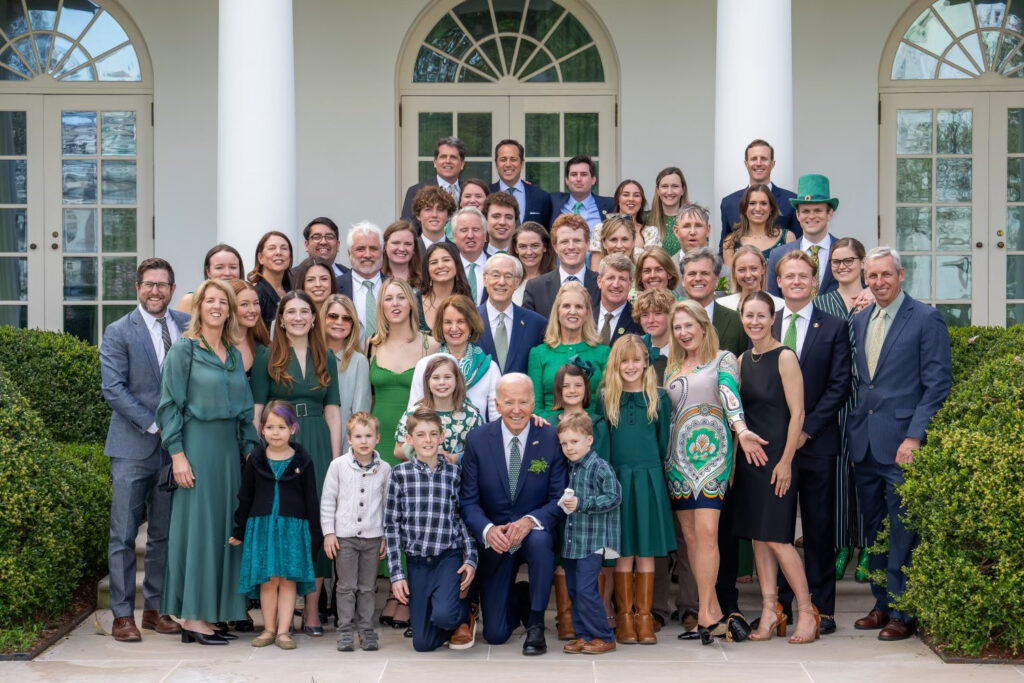
The Hatch Act
If there had been an endorsement given on St. Patrick’s Day, Joe Kennedy III may have been in violation of the Hatch Act. This act restricts federal employees from engaging in certain political activities to maintain a nonpartisan federal workforce. As a Special Envoy, Joe Kennedy III must adhere to these restrictions to avoid conflicts of interest.
April 19, 2024: Official Endorsement for Joe Biden
On April 19, 2024, an official endorsement for Joe Biden was made by five Kennedy family members. This endorsement brought the total number of endorsements to 6 out of 105 family members. Many news sources report that 12-15 family members endorsed Joe Biden that day, but no official record is available online. The only clear proof of an endorsement is from this video that was posted to social media after the event.
Family Members Endorsing Joe Biden
Despite the visible presence of some Kennedy family members in support of Joe Biden, these are the family members who are on record officially endorsing Joe Biden. These endorsements have often been interpreted as a broader family consensus, which is not the case.
- Joe Kennedy III: Works as the U.S. Special Envoy to Northern Ireland for Economic Affairs.
- Kerry Kennedy: Runs Robert F. Kennedy Human Rights and has publicly endorsed Biden.
- Rory Kennedy: An acclaimed filmmaker who has worked on projects funded by the Bill and Melinda Gates Foundation.
- Kathleen Kennedy Townsend: Works for the Department of Labor as a representative for retirement and pension issues, which ties her to the Biden administration.
- Chris Kennedy: Owns a commercial real estate firm and has endorsed Biden.
RFK Jr.’s Response to the Endorsements
In this interview, Robert F. Kennedy Jr. responded to his family members’ endorsement of Joe Biden. He emphasized that his family has learned to debate each other while still maintaining love and respect. He acknowledged that five family members work for the Biden administration and mentioned the Kennedy family’s historical ties to the Democratic National Committee (DNC).
Conclusion
The claim that Robert F. Kennedy Jr.’s whole family does not support him is a misconception. While some family members have publicly endorsed Joe Biden, it is important to recognize the diverse views within any family. These family members have not endorsed Kamala Harris.
RFK Jr. has received significant support from other family members who are actively involved in his campaign such as Amaryllis Kennedy who runs his campaign. Public disagreements do not equate to a lack of familial love and support, and it’s essential to consider the full spectrum of family and political dynamics. Everyone is entitled to their own opinion, and ultimately, their own vote. It is uncommon for families to agree on everything and the Kennedy family is being held to a standard no other family is.